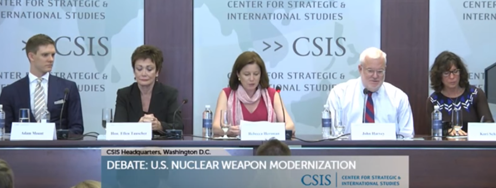Preventing a Nuclear 9/11 in Three Easy Steps
Guest blog by Alexandra Toma
This September 11, we will mourn those we lost. We will commemorate those who, like my high school classmate Andrew “Sterg” Stergiopoulos, sacrificed their lives to save others. And we will need to get serious about one of today’s top security threats: nuclear terrorism.
Interrogations leaked by Wikileaks earlier this year revealed that Khalid Sheikh Mohammed, the al-Qaeda operative who planned the September 11th terrorist attacks, said al-Qaeda would unleash a “nuclear hellstorm” if Osama bin Laden was killed. Bin Laden himself previously stated that he considered it a religious obligation to obtain nuclear weapons. If al-Qaeda obtains a nuclear weapon there is little doubt they will use it.
While obtaining a nuke is relatively difficult to do, obtaining the materials to build one is less difficult.
Since 1993, there have been at least 18 known cases of theft or loss of nuclear materials. Plus, these materials aren’t found in places like Fort Knox; rather, they are scattered around the world in unstable regions like Southeast Asia and the South Caucasus.
The bright side to this dark picture is that there are three initial steps policymakers can take now to prevent a future nuclear 9/11.
1. There needs to be global agreement that nuclear terrorism is a global threat. Despite the 2010 Nuclear Security Summit, where forty-seven world leaders gathered to discuss nuclear terrorism, many people believe nuclear terrorism is solely a “Western” problem. Global leaders need to get on the same page about the threat in order to devote the necessary resources to combat it worldwide.
2. Put our money where our mouth is. Both at home and internationally, anti-nuclear terror programs – programs that lockdown loose nukes and materials – are consistently underfunded. Policymakers proposing further cuts to these programs are being penny wise and pound foolish. Dollar-for-dollar, nuclear nonproliferation programs are some of the most effective we have in stamping out the threat of nuclear terror. They are a sound investment in preventing an attack that has the potential to inflict an exponentially greater cost in lives and treasure to our country. Last year alone, the National Nuclear Security Administration secured 800 bombs’ worth of material.
It’s not just our country that is skimping on nuclear nonproliferation programs. The Group of Eight nations’ “Global Partnership,” an international program that brings together twenty-one countries working collaboratively to stop the spread of WMD, is also consistently and grossly underfunded. In fact, this past May, though the countries renewed their commitment to this joint program, no funds were pledged to accomplish its goals.
3. Stop producing nuclear materials and accelerate their elimination. There is enough nuclear material in the world to make another 100,000 nuclear weapons. Halting production of fissile materials is an important step toward preventing those materials from falling into terrorists’ hands. Unfortunately, negotiations on a Fissile Materials Cutoff Treaty (FMCT) are being stalled by Pakistan in the Conference on Disarmament, the multilateral negotiating forum for treaties on arms control and disarmament. Diplomats can seek to move the FMCT to another, more flexible negotiating forum and get some progress on it. In addition, the United States can lead by example. We can begin by minimizing the number of locations at which nuclear materials are stored.
On March 27, 2012, world leaders have yet another opportunity to take bold action on global nuclear security. They will come together in South Korea for the second Nuclear Security Summit. Their goal is clear: countries need to finish the job they started at the 2010 Summit and push for real global security measures. You cannot solve only part of this problem. You have to solve it all.
And you can’t solve a problem unless you agree that there is a problem; unless you put your money where your mouth is; and unless you commit to getting rid of the vulnerable nuclear materials that are the source of the problem.
Alexandra Toma is founder and co-chair of the Fissile Materials Working Group (FMWG), an international coalition of nuclear security experts working to provide actionable policy recommendations to lockdown vulnerable nuclear materials and improve nuclear security policy.


